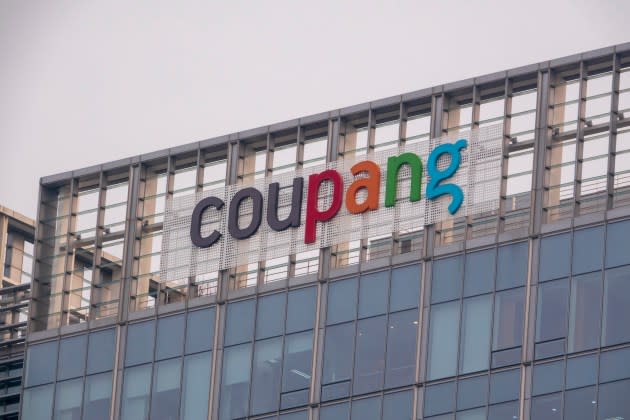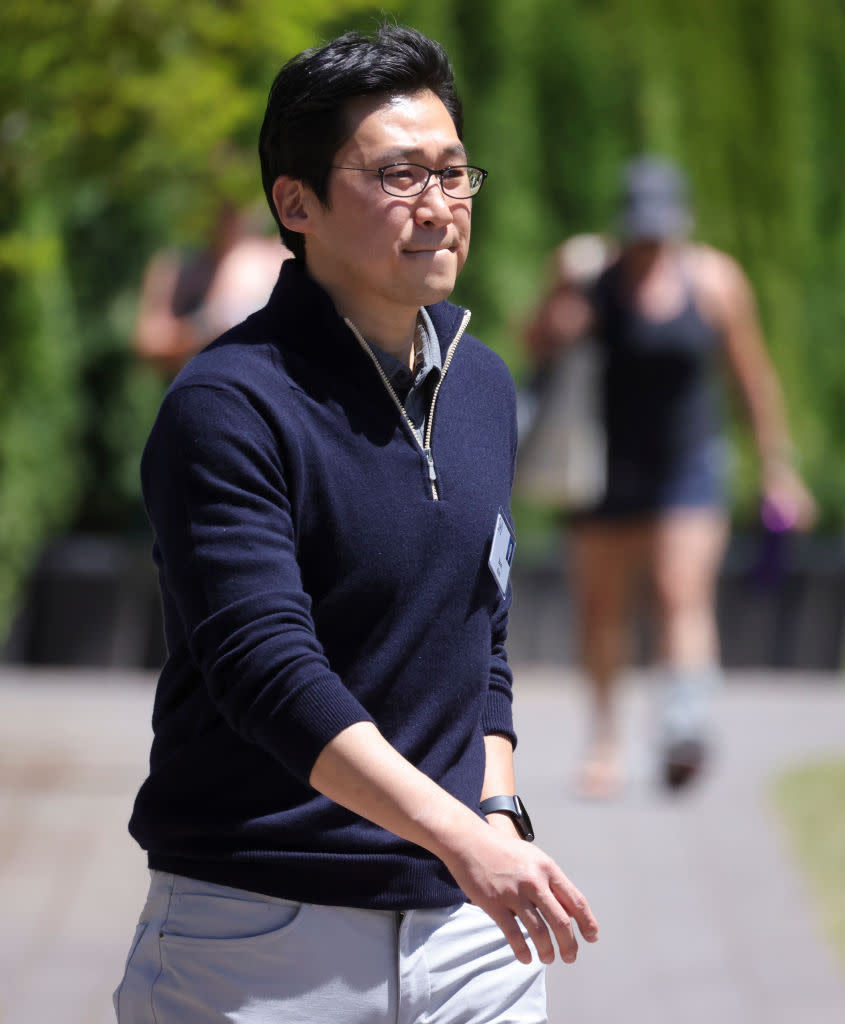South Korean Industry Experts Weigh In on Coupang’s Farfetch Rescue

LONDON — South Korean fashion industry experts are looking to make sense of Coupang’s decision to buy the troubled Farfetch.
As one of the largest online marketplaces in South Korea, Coupang is a Fortune 200 company listed on the New York Stock Exchange. It was founded by Bom Kim with backing from Japan’s SoftBank, the same investor who took a chance on Jack Ma’s Alibaba, among others.
More from WWD
London Retailer Matches Latest to Go in Luxury E-commerce Fire Sale
Richemont Confirms Long-awaited Deal to Sell YNAP to Farfetch and Alabbar Is Off the Table
With a current market capitalization of around $29 billion, the global retailer, which is sometimes referred to as “the Amazon of South Korea,” employs 63,000 people across e-commerce, delivery, streaming and payment verticals. For the nine months ended Sept. 30, the company posted net earnings of $327 million on revenues of $17.8 billion.
According to Jeffrey Jin, partner at the communication agency Boh Korea, which looks after brands like Calvin Klein, Amiri and Mugler, Coupang is “a vital part of daily life for many Koreans, offering convenience, reliability and innovation in e-commerce.”
“They also pioneered same-day delivery in South Korea, setting new standards for online shopping,” he added.
Eudon Choi, a London-based fashion designer from South Korea, said he was surprised to see that a mass-market player like Coupang would end up buying Farfecth.
“Coupang is for anything but fashion,” said Choi, adding that the majority of the local customers still prefer to shop fashion physically.
Moquee Joon, a former buyer at the Shinsegae-owned boutique Boon the Shop and founder of Future Society Showroom, which represents Korean fashion brands like Eenk, Ethos and Bom Bom, as well as Milanese brand Gabriele Colangelo and Keta Gutmane from Latvia, observed that the local luxury retail market is still dominated by the chaebols, a word meaning conglomerates in Korean, like Samsung’s Shinsaege, Lotte and Hyundai.
“They are the three biggest fashion distributors via their department stores, supermarkets and online channels. Their sister companies like Lotte GF, Hyundai’s Handsome and Shinsegae International are doing import business for luxury brands as well,” Joon said.
Among those companies, Joon said Shinsegae International is the biggest and oldest player as it still serves as a local partner to companies like OTB, Giorgio Armani, Rick Owens, Stella McCartney and Sacai.
Its own luxury online marketplace S.I.Village offers a selection of fashion, beauty and lifestyle items from 1,200 brands. With Shinsegae’s acquisition of eBay Korea in 2021, Joon said the company has been building an e-commerce empire of its own as well.
New and digital-first players in the sector include Musinsa, a leading fashion marketplace in South Korea with more than 14,000 local and global brands selling to its 20 million users. In July, it raised $130 million in a series C funding round headed by the global private equity firm KKR.
Another one to know is Kream, a fast-growing luxury resale marketplace founded by South Korea’s top search engine Naver with backing from SoftBank and Samsung.
“Both of them have been actively introducing middle to high-end brands to the general public of South Korea and have been very successful this year,” said Jin, adding that the local fashion community also relies on Matches, Ssense, Farfetch or a brand’s own online platform to access a wider selection of items than the offline select shops.

Indeed, before the Farfetch purchase, Coupang was not known for selling fashion or luxury items, but it has been looking to enter the sector.
In June, Coupang launched Rocket Luxury, a luxury cosmetics vertical with brands like Estée Lauder and Sulwhasoo that offers same-day delivery.
With Coupang’s core category, including daily necessities, showing signs of a slowdown in growth, a recent Bernstein report pointed out that the platform is seeking to expand its offerings in new categories that “do not rely as heavily on its unique dawn shipping service.”
“We think Coupang will highly likely use Farfetch to source tier two, tier three and lower-tiered fashion and luxury brands to add a ‘vertical’ in South Korea,” Bernstein noted.
“There are several Farfetch-like luxury platforms including Balaan, Tren:be and Must’it, but there is no prominent market leader, and the revenue level is not as significant,” explained Lisa Hong, a Euromonitor consultant, of the South Korean luxury e-commerce landscape.
“Although e-commerce is huge in South Korea, consumers still prefer and skew to offline stores like department stores for luxury items,” Hong added. “That’s why online platforms are actively engaging in offline pop-up events to keep up with the trend.”
According to Hong, a strong contender to Rocket Luxury is Kakao Gift within KakaoTalk, South Korea’s go-to messenger app, which allows users to send small luxury items as well as more luxurious ones such as Gucci handbags, Piaget timepieces or five-star hotel vouchers.
Joon revealed that before the Farfetch acquisition, Coupang hired an executive to help it expand into fashion, but that didn’t quite work out.
“Since the image they build is mass market-oriented, having another platform like Farfetch allows them to have more freedom to play in the field of luxury. But there are many similar platforms like Farfetch in South Korea already, so they should check all the market situations, not just competition from Lotte, Shinsegae and Hyundai,” Joon said.
One competitive advantage Coupang has, in the eyes of Joon, is its sophisticated logistic and delivery infrastructure.
“At least in South Korea, customers love it when they order something, they want to receive it as fast as possible, and that’s why Korean people love Coupang,” Joon added.
Despite the uncertainty ahead, Jin sees Coupang’s acquisition of Farfetch to be a major step in the development of South Korean e-commerce, which “has always been on a slightly slower end of development” compared to China, where selling luxury online has become a norm due to the fierce competition between Alibaba and JD.com over the past decade.
“It shows Coupang’s ambition to enter the luxury fashion market and bring a more centralized service not only for South Korea but also advance into a global competition,” added Jin.
A point of reference to what Coupang’s fashion business could eventually look like with Farfetch in its portfolio would be JD.com, Farfetch’s local partner in China before it decamped to Alibaba in 2020 as part of the now-failed mega partnership with Compagnie Financiere Richemont.
Due to Alibaba’s monopolistic terms, JD.com had a rough start in the sector despite offering attractive incentives to luxury brands like a premium “white glove” delivery service, efficient directly owned logistic system and sizable active daily user base. These would be similar talking points Coupang has in regard to how Farfetch can help the group grow its fashion business in South Korea.
Things improved in 2020 after JD.com began to offer its omnichannel solutions to luxury brand partners, which is not dissimilar to the platform solutions service Farfetch provides to brands and retailers like Balenciaga, Harrods, Paul Smith, Audemars Piguet and Palace. The Chinese company has since attracted major players such as Louis Vuitton, Bulgari, Mytheresa, Joyce Beauty and many more to sell on JD.com.
Joon said it’s reasonable to assume that Coupang would leverage Farfetch’s existing tech prowess on top of its wide reach and efficient logistics to onboard more luxury brands and retailers amid South Korea’s intensifying luxury e-commerce competition.
“We expect they can use that kind of delivery system for the luxury market. They have the money and power to do so. But I am wondering if they can stretch the price range to cater to both ends’ needs. We shall see how it goes,” added Joon.
Best of WWD

